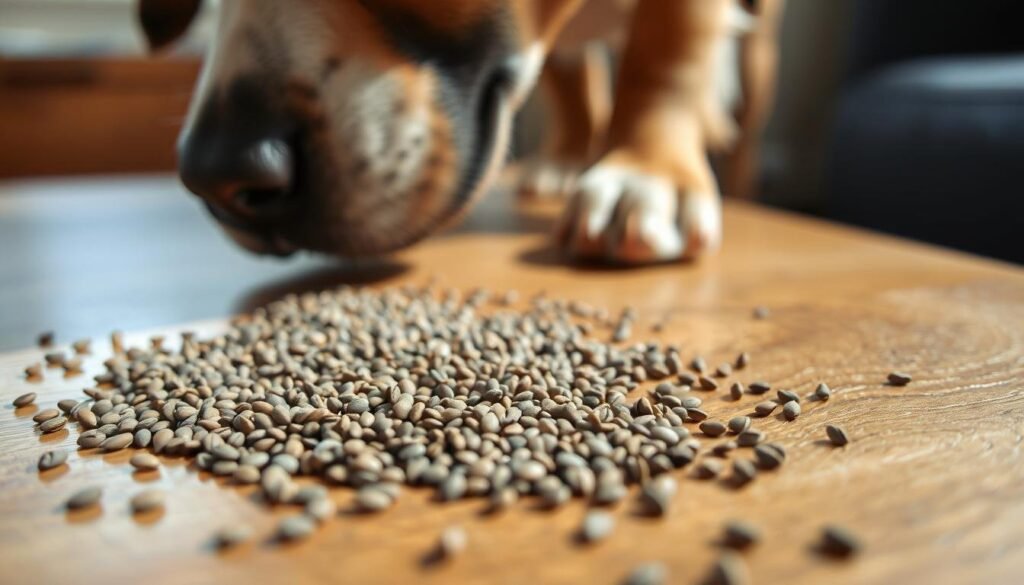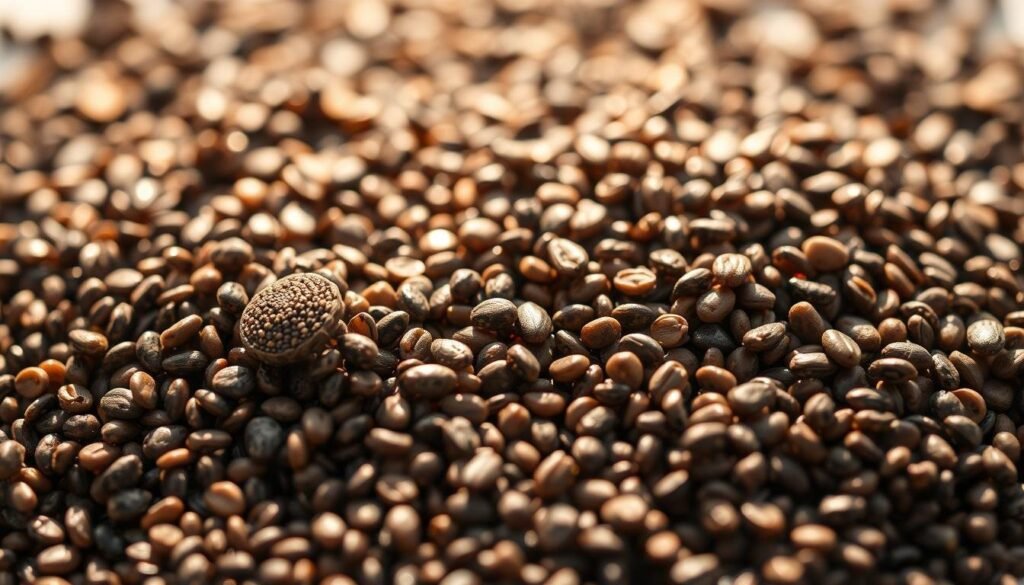If you’re a dog owner, you’re always looking for ways to keep your pet healthy. One key area is canine digestion health. A healthy gut helps your dog get the nutrients they need, keeping them full of energy.
There’s a growing interest in using supplements to help dogs’ digestion. Chia seeds are getting attention for their potential benefits. They’re packed with nutrients that could help your dog’s digestive system.
So, how can chia seeds help your dog? Adding chia seeds to their diet might make their digestive system healthier. This is important for their overall health.
Contents
- 1 Understanding Canine Digestion and Dietary Needs
- 2 Are Chia Seeds Good for Dogs’ Digestion?
- 3 Benefits of Chia Seeds for Dogs Beyond Digestion
- 4 Potential Risks and Considerations
- 5 How to Safely Introduce Chia Seeds to Your Dog’s Diet
- 6 Conclusion
- 7 FAQ
- 7.1 Are chia seeds safe for my dog to consume?
- 7.2 How do chia seeds support my dog’s digestion?
- 7.3 Can chia seeds cause allergies in dogs?
- 7.4 How should I introduce chia seeds to my dog’s diet?
- 7.5 Can chia seeds be used as a treatment for digestive issues in dogs?
- 7.6 Are there any potential risks associated with feeding chia seeds to my dog?
- 7.7 Can I give chia seeds to my dog every day?
- 7.8 How do I choose high-quality chia seeds for my dog?
Understanding Canine Digestion and Dietary Needs
A dog’s diet is key to their digestive health. Their digestion breaks down nutrients from food to keep them healthy.
Dogs need a balanced diet full of important nutrients. Nutrients like proteins, fats, carbohydrates, vitamins, and minerals are vital for their health.
Key Nutrients for Optimal Canine Digestion
The table below shows important nutrients and their roles in a dog’s digestion:
| Nutrient | Role in Canine Digestion |
|---|---|
| Proteins | Build and repair tissues, including muscles and organs. |
| Fats | Provide energy and aid in the absorption of vitamins. |
| Carbohydrates | Serve as a source of energy and support digestive health. |
| Vitamins and Minerals | Support various bodily functions, including immune response and nerve function. |
It’s important to make sure your dog gets these nutrients. A diet that fits their needs can prevent digestive problems and keep them healthy.
Are Chia Seeds Good for Dogs’ Digestion?
Chia seeds are packed with nutrients that help dogs digest food better. They are full of fiber, omega-3 fatty acids, and minerals. These help keep a dog’s digestive system healthy.
Chia seeds are high in fiber, which is great for dogs. Fiber keeps bowel movements regular and prevents constipation. It also helps good bacteria grow in the gut, keeping it healthy.
How Chia Seeds Can Support Canine Digestion
Chia seeds are a great source of omega-3 fatty acids, especially ALA. These fats fight inflammation in the digestive system. This is good for dogs with inflammatory bowel disease or other digestive problems.
Chia seeds also have antioxidants. These protect the digestive system from damage. This helps keep dogs healthy and happy.
To add chia seeds to your dog’s diet, start small. Mix them with their food or use them as a topping. Watch how they react to them.
Some benefits of chia seeds for dogs include:
- Supporting healthy bowel movements
- Reducing inflammation in the digestive tract
- Promoting a healthy gut microbiome
- Providing essential nutrients and antioxidants
Adding chia seeds to your dog’s diet can boost their digestive health. Always talk to a vet before changing their diet.
Benefits of Chia Seeds for Dogs Beyond Digestion
Chia seeds offer more than just digestive benefits for dogs. They support your dog’s overall health and wellbeing. One key benefit is their support for canine skin health.
Chia seeds are packed with omega-3 fatty acids. These are vital for a dog’s skin and coat health. Omega-3s help reduce inflammation, which can cause itchiness and irritation. Adding chia seeds to your dog’s diet can lead to healthier skin and a shinier coat.
Chia Seeds as a Source of Energy for Dogs
Chia seeds are also a great energy source for dogs. They contain complex carbohydrates that release energy slowly. This is perfect for active dogs or those that exercise regularly.
| Nutritional Benefit | Chia Seeds | Other Grains |
|---|---|---|
| Omega-3 Content | High | Low |
| Complex Carbohydrates | High | Variable |
| Antioxidant Content | High | Variable |
Adding chia seeds to your dog’s diet can greatly improve their health. They support skin health and provide natural energy. As part of a balanced diet, chia seeds can boost your dog’s wellbeing and vitality.
When adding chia seeds to your dog’s nutrition plan, remember that every dog is unique. Watch how your dog reacts to chia seeds and adjust their diet as needed. This ensures the best benefits from this nutritious supplement.
Potential Risks and Considerations
Adding chia seeds to your dog’s diet needs careful thought. Chia seeds are usually safe, but there are things to watch out for. This ensures they are safe for your dog to eat.
One big worry is allergies or sensitivities to chia seeds. Canine allergies can cause skin problems, stomach issues, or serious reactions. It’s important to watch how your dog acts and feels after eating chia seeds.
Introducing Chia Seeds Safely into a Dog’s Diet
To avoid bad reactions, start with a tiny amount of chia seeds. Watch how your dog reacts. Here’s how to do it right:
- Start with a small dose (about 1/4 teaspoon per 10 pounds of body weight).
- Slowly add more over days or weeks, based on your dog’s tolerance.
- Watch for any signs of allergy or sensitivity.
The table below shows signs of chia seed allergy or sensitivity in dogs. It also tells you what to do:
| Symptom | Description | Action |
|---|---|---|
| Skin Irritation | Redness, itching, or rashes on the skin. | Stop chia seeds and see a vet. |
| Digestive Issues | Vomiting, diarrhea, or loss of appetite. | Lower or stop chia seed intake; see a vet if it doesn’t get better. |
| Respiratory Problems | Coughing, sneezing, or trouble breathing. | Get vet help right away. |

Knowing these risks and introducing chia seeds carefully can help. This way, your dog can enjoy chia seeds safely and avoid any bad effects.
How to Safely Introduce Chia Seeds to Your Dog’s Diet
To get the most out of chia seeds for your dog, start with a slow introduction. Adding chia seeds to your dog’s diet can boost their nutrition. But, it’s important to do it right to avoid any bad reactions.
First, make sure to choose high-quality chia seeds. Look for organic, clean chia seeds. The quality of chia seeds affects their nutrition and safety for your dog.
Gradual Introduction to Prevent Adverse Reactions
When adding chia seeds, start small. Begin with a teaspoon and slowly increase the amount. This helps your dog’s stomach get used to the new food.
Keep an eye on how your dog reacts to chia seeds. Look out for signs like diarrhea or vomiting. If you see any bad reactions, cut back or stop using them.
Here are some tips for safely introducing chia seeds to your dog’s diet:
- Start with a small amount (about 1 teaspoon) mixed with their regular food.
- Gradually increase the amount over a period of days or weeks.
- Monitor your dog’s stool quality and overall health.
- Adjust the amount based on your dog’s response.
Chia seeds can also be mixed with water to make a gel. This can help your dog digest them better.
By following these steps and watching your dog’s health, you can safely add chia seeds to their diet. This could improve their health and wellbeing.
Conclusion
If you’re a dog owner, you’re always looking for ways to keep your pet healthy. Chia seeds can help with digestion and provide important nutrients. Knowing the good and bad of chia seeds helps you decide if they’re right for your dog.
Adding chia seeds to your dog’s diet should be done carefully. Start with a little and watch how your dog reacts. Chia seeds are packed with nutrients and can be great for your dog’s health.
FAQ
Are chia seeds safe for my dog to consume?
Yes, chia seeds are safe for dogs in small amounts. But, start with a little to avoid any bad reactions.
How do chia seeds support my dog’s digestion?
Chia seeds have lots of fiber. This helps keep your dog’s digestion healthy by preventing constipation.
Can chia seeds cause allergies in dogs?
It’s rare, but some dogs might be allergic to chia seeds. Watch your dog closely after adding chia seeds. If they show signs of an allergy, talk to a vet.
How should I introduce chia seeds to my dog’s diet?
Start with a small amount, like 1/4 teaspoon for every 10 pounds of your dog’s weight. Mix it with their food and slowly add more.
Can chia seeds be used as a treatment for digestive issues in dogs?
Chia seeds can help with digestion, but don’t use them instead of vet care. If your dog has digestive problems, see a vet for the right treatment.
Are there any potential risks associated with feeding chia seeds to my dog?
Too much water with chia seeds can cause a gel in your dog’s stomach. Make sure they drink enough water and add chia seeds slowly.
Can I give chia seeds to my dog every day?
Yes, but only in small amounts. Give about 1/4 teaspoon per 10 pounds of body weight each day.
How do I choose high-quality chia seeds for my dog?
Choose organic, non-GMO chia seeds without contaminants. Pick a trusted brand that ensures quality and safety.

Derrick Wilcox is a certified canine behaviorist with over 12 years of experience at Happy Paws Animal Clinic and Pawsitive Training Center, helping pet owners ensure safer, healthier, and happier lives for their dogs.



